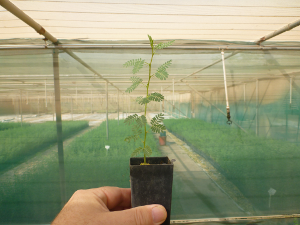Saudi Arabia: Kings Park and Botanic Garden bringing the desert to life
In a world facing problems of increasing desertification, Kings Park - located in Western Australia - has developed a range of research and extension initiatives in the arid regions of the Middle East, aimed at environmental, conservation and horticultural programmes.

‘The Edge of the World’, a dramatic landscape at Alhisseya Natural Area, 2011. Photo © Patrick Courtney
Since 2008, Kings Park has undertaken activities in Bahrain, Kuwait and Oman, with the main initiatives occurring in Saudi Arabia, partnering with the Arriyadh Development Authority (ADA). The ADA is a key government authority, responsible for the development of Riyadh - the capital of Saudi Arabia, and the surrounding region. Present in the region are a number of land types, including extensive natural areas representing a range of ecotypes. ADA is committed to the conservation and management of natural resources in the region. Pressure from overgrazing, firewood collection, camping and loss of habitat are major environmental issues.Strategic development and planning has focused on the development of nature conservation strategies for the Arriyadh region. Kings Park is leading a multidisciplinary, international team to assist ADA to provide strategic direction to stakeholders and the broader community. Other works have focused on the master-planning of existing programmes, and the development of significant parks in the region.

Strategic planning meeting ‘Arabian Style’, CEO Mark Webb (centre left) in discussion with ADA management team. Photo © Ben Miller
A science driven program of global significance relating to restoration ecology and natural resource management has been developed and is centred on Thumama Nature Park. 70km north of the Saudi capital Riyadh, Thumama is a unique desert park of great beauty, and is an important natural area resource for current and future recreation in the region. Kings Park is undertaking major ecological studies relating to restoration and management at a landscape-scale, with focus on the restoration of dominant Acacia trees. The work is potentially significant to the Middle East region as a whole
The study looks to increase our basic understanding of ecological theory for Acacia communities and improving the principles of restoration. Since January 2013, the study has involved the installation of 100,000 greenstock plants and precision sowing of 140,000 seed into carefully designed experiments. Sixteen hectares of high technology irrigation has been established in the Arabian Desert, providing the study with an ‘outdoor laboratory’ to better understand plant-water relationships and restoration limitations in arid and semi-arid landscapes. Leading edge science including advanced and novel eco-physiology, soil science and eco-hydrological monitoring is providing state-of-the-art information on how to optimise restoration efforts. Greenstock ‘priming’ and seed enablement are major factors being tested, along with seasonality of instalment, fertilization and soil ameliorations. A major aim of the study is to provide low cost and scalable solutions for broad-scale restoration that can be applied in Saudi Arabia and across the Middle East more generally.

Estimated 500 year old cacia at Al Hissea Natural Area, 2011. Photo © Patrick Courtney
Stage 2 of the trials installation, and the first environmental plantings based on initial findings, were undertaken in November 2013. This was followed by significant rainfall events which have provided the study with benchmark conditions.
The Thumama studies have been driven by key associated programs developed by Kings Park to increase capacity including; training and skilling; technology transfer and infrastructure development, and institutional advancement. Major initiatives include the design and development of a dedicated seedbank facility for native species; dedicated seed collection programmes; technology input and restoration of nursery facilities; development of advanced tubestock production systems, and intensive staff training and skilling programmes.

First large scale tubestock production in Saudi Arabia – Acacia gerrardii ssp. negevensis at ADA nursery complex.
Future developments are aimed at the design and development of new dedicated native plant nurseries for high volume production; interpretive visitor facilities at the Thumama Park trial site; trial large-scale environmental plantings and development of natural area resource planning, and Saudi Arabian native species for Urban Horticulture.
Patrick Courtney
If you would like to learn more about Kings Park and Botanic Garden, go to: http://www.bgpa.wa.gov.au/